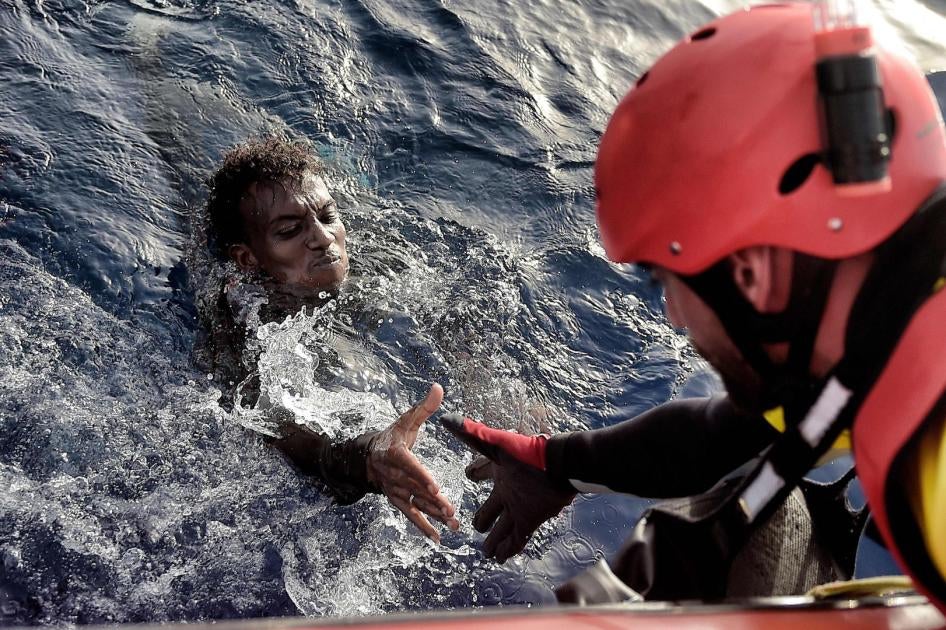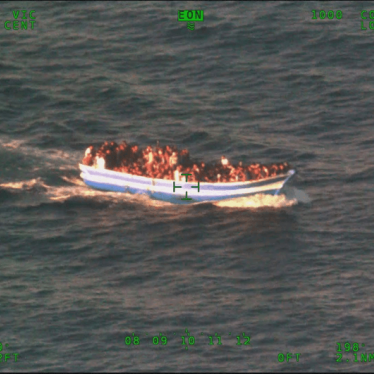(Milan) – Measures to tackle boat migration in the central Mediterranean – proposed on July 3, 2017, by the European Union migration commissioner and the interior ministers of Italy, France, and Germany – fall far short of what is needed, Human Rights Watch said today.
EU interior ministers gathering in an informal summit on July 6-7 should explore more ambitious plans to ensure more equitable sharing of responsibility for the lives and rights of those leaving Libya by sea, including functioning disembarkation and relocation plans.
“These proposals on boat migration fall far short of a genuine roadmap for sharing responsibility. That’s not good for the EU, it’s not good for Italy, and it’s awful for people fleeing Libya,” said Judith Sunderland, associate Europe and Central Asia director at Human Rights Watch. “Long-term goals, however laudable, cannot obscure the current stark reality: with abusive conditions, lack of asylum system, and conflicts there, Libyan authorities cannot effectively guarantee rights or protect people.”
The measures outlined yesterday for the most part endorse intensifying current plans with respect to building the capacity of the Government of National Accord (GNA) to control Libya’s borders, increasing returns from EU countries, and relocation out of Italy of certain asylum seekers to other EU countries. The UN-backed GNA, based in Tripoli, is one of three authorities vying for international legitimacy and control of territory.
The joint statement comes after the Italian government asked for other EU countries to disembark migrants and asylum seekers rescued in the Mediterranean, and the country’s interior minister said it was considering blocking disembarkation in Italy of migrants and asylum seekers rescued by ships not flying the Italian flag and not part of international naval operations. Italy performs or coordinates virtually all rescue operations in the Mediterranean, and about 85,000 people have been disembarked in Italy since January. More than 2,000 have died at sea this year.
A well-coordinated plan among EU countries on the Mediterranean Sea – notably Malta, France, and Spain – to share responsibility for disembarkation is worth exploring as a way to alleviate the strain on Italy’s reception system, Human Rights Watch said.
Instead, the statement calls for accelerating the existing EU relocation scheme, with France and Germany pledging to increase their efforts. The relocation plan was narrowly-drawn and poorly implemented, and even under the best of circumstances will benefit a tiny fraction of those reaching Italian shores, Human Rights Watch said.
France, Germany, and other EU member states should adopt broader eligibility criteria to enable more people to access the relocation plan, and ensure that requests for relocation of unaccompanied children and those with family members in EU countries are swiftly processed.
The statement also includes a proposal for a code of conduct for nongovernmental organizations performing rescues at sea.Improved coordination, codes of conduct, and best practices are important for all actors involved in search and rescue in the Mediterranean. EU governments should also recognise that nongovernmental organizations perform important rescue efforts in the Mediterranean, often in the areas where EU vessels operating under Frontex and the EU’s anti-smuggling operation, EUNAVFOR MED, are not present, Human Rights Watch said.
Any new arrangements or instructions on response to situations of distress at sea should ensure that EU vessels are not obligated to cede rescue operations in international waters to Libyan forces, and should guarantee that any nearby vessels will fulfil their rescue obligations in Libyan territorial waters in situations posing the threat of imminent loss of life.
Migrants and asylum seekers in Libya face arbitrary detention in abysmal conditions and a well-documented risk of serious abuse, including forced labor, torture, and sexual violence. Fragmented Libyan coast guard forces lack the capacity to safely perform search-and-rescue obligations. As far as Human Rights Watch is aware, EUNAVFOR MED and relevant EU member states and institutions have yet to set up a mechanism to monitor the training program for Libyan coast guard forces or efforts to improve conditions in detention centers.
EU interior ministers gathering in an informal summit on July 6-7 should explore more ambitious plans to ensure more equitable sharing of responsibility for the lives and rights of those leaving Libya by sea, including functioning disembarkation and relocation plans.
“These proposals on boat migration fall far short of a genuine roadmap for sharing responsibility. That’s not good for the EU, it’s not good for Italy, and it’s awful for people fleeing Libya,” said Judith Sunderland, associate Europe and Central Asia director at Human Rights Watch. “Long-term goals, however laudable, cannot obscure the current stark reality: with abusive conditions, lack of asylum system, and conflicts there, Libyan authorities cannot effectively guarantee rights or protect people.”
The measures outlined yesterday for the most part endorse intensifying current plans with respect to building the capacity of the Government of National Accord (GNA) to control Libya’s borders, increasing returns from EU countries, and relocation out of Italy of certain asylum seekers to other EU countries. The UN-backed GNA, based in Tripoli, is one of three authorities vying for international legitimacy and control of territory.
The joint statement comes after the Italian government asked for other EU countries to disembark migrants and asylum seekers rescued in the Mediterranean, and the country’s interior minister said it was considering blocking disembarkation in Italy of migrants and asylum seekers rescued by ships not flying the Italian flag and not part of international naval operations. Italy performs or coordinates virtually all rescue operations in the Mediterranean, and about 85,000 people have been disembarked in Italy since January. More than 2,000 have died at sea this year.
A well-coordinated plan among EU countries on the Mediterranean Sea – notably Malta, France, and Spain – to share responsibility for disembarkation is worth exploring as a way to alleviate the strain on Italy’s reception system, Human Rights Watch said.
Instead, the statement calls for accelerating the existing EU relocation scheme, with France and Germany pledging to increase their efforts. The relocation plan was narrowly-drawn and poorly implemented, and even under the best of circumstances will benefit a tiny fraction of those reaching Italian shores, Human Rights Watch said.
France, Germany, and other EU member states should adopt broader eligibility criteria to enable more people to access the relocation plan, and ensure that requests for relocation of unaccompanied children and those with family members in EU countries are swiftly processed.
The statement also includes a proposal for a code of conduct for nongovernmental organizations performing rescues at sea.Improved coordination, codes of conduct, and best practices are important for all actors involved in search and rescue in the Mediterranean. EU governments should also recognise that nongovernmental organizations perform important rescue efforts in the Mediterranean, often in the areas where EU vessels operating under Frontex and the EU’s anti-smuggling operation, EUNAVFOR MED, are not present, Human Rights Watch said.
Any new arrangements or instructions on response to situations of distress at sea should ensure that EU vessels are not obligated to cede rescue operations in international waters to Libyan forces, and should guarantee that any nearby vessels will fulfil their rescue obligations in Libyan territorial waters in situations posing the threat of imminent loss of life.
Migrants and asylum seekers in Libya face arbitrary detention in abysmal conditions and a well-documented risk of serious abuse, including forced labor, torture, and sexual violence. Fragmented Libyan coast guard forces lack the capacity to safely perform search-and-rescue obligations. As far as Human Rights Watch is aware, EUNAVFOR MED and relevant EU member states and institutions have yet to set up a mechanism to monitor the training program for Libyan coast guard forces or efforts to improve conditions in detention centers.









